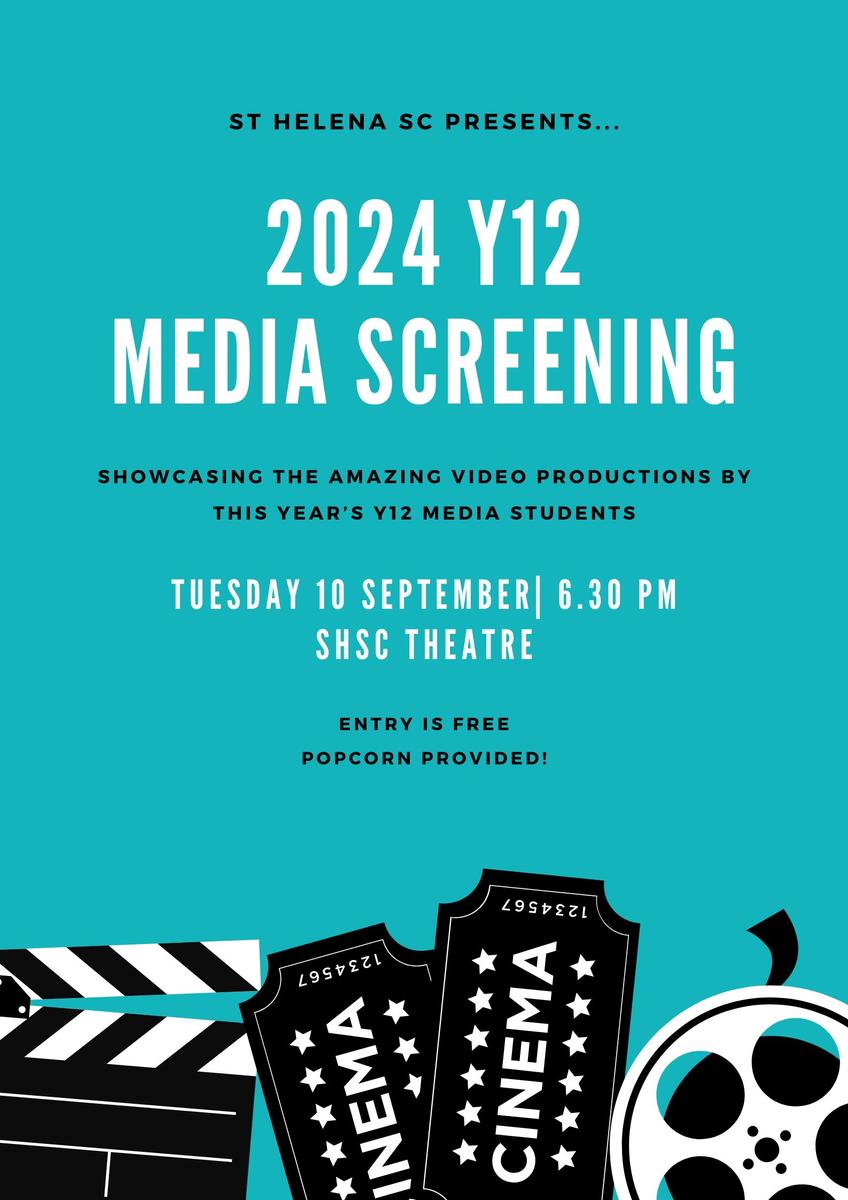Need to Know

My sincere apologies for missing the previous Bulletin. I was unfortunately laid up with a nasty virus and then attending a Principal's Conference. It seems there are quite a few bugs going around at the moment, and I urge parents to keep students home if they are unwell. If you anticipate an absence extending beyond a couple of days, please contact your child's mini school so that work can be sent home. It's crucial for students to stay on top of their studies as much as their health allows.
Parent/teacher interviews will be held on the 19th and 20th of September. Students will be dismissed at 1.05 on the 19th (buses available) to allow face to face meetings throughout the afternoon and evening. The 20th of September is a pupil free day, with parents able to book parent/teacher interviews on line. We hope the option of both face-to-face and on-line creates opportunity for all parents to engage with teachers.
Alumni Achievement
St Helena is incredibly proud of Alumni Paralympian and ex College Captain Jaryd Clifford. Jaryd, a vision impaired athlete, ran a closely contested 5000m race in Paris, finishing third but unfortunately disqualified for letting go of his guide's tether before the finish line.
We were thrilled to see Jaryd finish fourth in the men's 1500m race. Anyone who knows Jaryd will agree with my statement that not only is he an amazing athlete, he is a top human being, a great speaker and a fabulous ambassador for his sport and for our country.
Mamma Mia – What a Show!
A heartfelt congratulations to the cast and crew of our spectacular production, Mamma Mia.
The first week saw a sell-out success, with only a few tickets remaining for the rest of the shows. Special thanks to Director Laura Zinghini, who has once again worked her magic, along with Steph Gardiner (Choreographer), Catherine Bates (Musical Director), and Amanda Egglestone (Producer). The performance was enhanced by the seamless soundtrack created by our talented musicians.
And, what a set!! The audience was transported to the Greek Islands. Front of house had some amazing "merch" to sell - with a re-order required after the first week. Thanks to Lyn Bartlett for all her work running front of house with such creativity and dedication.
A huge thank you also to the army of other volunteers, including alumni, parents, and other dedicated supporters, who helped bring this magical spectacle to life. Additionally, our VET Hospitality students, under the guidance of trainer Breda O'Donovan, catered a Greek Island-inspired feast for the VIP night. Their contribution was truly appreciated and enjoyed by all.
Student Forum Recommendations
Our recent Student Forum has produced a well-structured paper of recommendations based on comprehensive data analysis and consultations. This document will be distributed to key decision-making bodies within the college, ensuring that our students' voices are genuinely heard. We commend our future leaders for their thoughtful and considered approach.
Raffle Fundraiser Update
A big thank you to all the families who have volunteered to sell raffle books. We currently have 400 raffle books out, potentially raising $40,000 if all are sold! We have secured space at Greensborough Plaza for additional ticket sales and will soon be calling for volunteers to help staff the ticket stall. If you would like more tickets to sell or to volunteer at the stall, please contact the general office at 9438 8500. For those interested in purchasing tickets for a chance to win one of 64 great prizes, including a $10,000 travel voucher, please email askleadership@sthelena.vic.edu.au with your name, phone number, and the number of tickets you wish to buy.
Attendance Matters
In the coming week, we will be contacting parents of students with less than 70% attendance. Consistent attendance is crucial, as missing just one day a week can result in a year of missed schooling over a student’s school life. If your child is genuinely unwell, please keep them home, but for other reasons such as tiredness or birthdays, we expect them to be at school. We are here to offer support if attendance is a concern. Please reach out to askleadership@sthelena.vic.edu.au for assistance.
Right to Disconnect Policy
Legislation recently passed regarding workers' right to disconnect means that staff, including the Principal class, may choose not to respond to communications outside of working hours or on school holidays. We adhere to a two-business-day response policy. If you do not receive a timely response to your voicemail or email, please email askleadership@sthelena.vic.edu.au and I will personally follow up for you.
Uniform Reminders
A reminder regarding uniform exemptions: these will only be granted with clear, documented support from a medical professional specifying the issue and that it cannot be addressed through a uniform modification. Uniform exemption forms are available on our website and must be completed in full. Exemptions will not be granted solely based on discomfort, as our uniform includes many options to cater to different needs. Adhering to our uniform policy prepares students for future workplace expectations, whether involving uniforms or specific dress codes.
Free Media Screening
Do you want to laugh, feel joy, suspense and maybe even cry?!
Come join us for the annual Year 12 Media Video Showcase! A collection of amazing short films, animations, music videos and documentaries by our very talented Y12 Media students.
Tuesday 10th September
6.30pm
St Helena Theatre
entry is free
FYI Victorian Attendance Legislation
In Victoria, it is compulsory for children and young people aged 6–17 years to attend school.
Parents are legally required to ensure their child attends school every day and to provide an explanation for their child's absence from school unless an exemption from attendance has been granted or an exception to their attendance applies.
Evidence shows that daily school attendance is important for young people to succeed in education and to ensure they don’t fall behind both socially and developmentally. Young people who regularly attend school and complete Year 12 or an equivalent qualification have better health and employment outcomes and enjoy higher incomes.
The law provides a framework for school’s attendance, exemptions and exceptions from attendance and parents’ obligations relating to ensuring attendance. The rules are not in place to punish students’ time away from school, which can be unavoidable. Instead, the laws are an effort to promote and improve student attendance across Victorian schools.
The compulsory school age
All children aged 6–17 years are required to either be enrolled at a registered school, or registered for home schooling. In some circumstances a parent can apply to the Regional Director to exempt a child from enrolment at school. For more information see: Exemptions
Responsibility for ensuring that a child attends school
School attendance is mandated under the Education Training and Reform Act 2006. It is the responsibility of parents, guardians or anyone who has parental responsibility for a child to ensure the child attends school on a regular basis.
How attendance is recorded by schools
Schools must record student attendance twice per day in primary schools and every period in secondary schools.
Requirements that apply to children attending non-government schools
The rules apply to parents of compulsory school-aged children attending any Victorian Government, Independent and Catholic Schools.
‘Poor attendance’ for the purpose of the legislation
What is considered as “poor attendance” is determined on a case by case basis. However, under the legislation, if a student of compulsory school age is absent from school for five days within a school year and without a reasonable excuse, then further action can be taken, at the discretion of the principal.
Unexplained or unapproved absences
A principal can approve or not approve any absence, based on the requirements of the Education and Training Reform Act 2006, an individual school policy or on a case-by-case basis.
The Education and Training Reform Act 2006 provides some examples of what a reasonable excuse is for the purposes of explaining a school absence and includes, amongst other considerations:
- Illnesses and accidents;
- Unforeseen and unexplained circumstances;
- If the absence was a result of complying with another law;
- The child is receiving distance education through a registered school;
- The child is undertaking approved education, training and/or employment;
- The child has been suspended or expelled; and
- The child is attending or observing a religious event or obligation.
Unexplained Absence:
A principal will record an absence as ‘unexplained’ if no explanation about the absence is given to the school by the parent or carer of the student.
If you do not contact the school to provide an explanation on the day of the student absence, the school must attempt to contact the parent or legal guardian either by phone or in writing and seek an clarification within three days of the recorded absence.
If no contact can be made with the parent or other carers of the child within 10 days, the absence will be recorded as an unexplained absence and a noted will be made in the child’s file. A parent or legal guardian can contact the principal at any time after the recorded absence to provide an explanation.
Unapproved Absence:
In general, a principal may record an absence as ‘unapproved’ when no reasonable explanation has been given for the student’s absence. If a reason is given for a student absence is not approved by the principal than the school will notify the parent or legal guardian in writing.
Action that will be taken if your child reaches five days of unapproved or unexplained absence
If a child reaches five days of unapproved or unexplained absence in the preceding 12 months then the school and principal will work with the parent or legal guardian to implement the appropriate support or intervention to assist the child and ensure they attend school every day and remain at school during school hours. If the support and intervention do not improve your child’s attendance, the principal may decide to make a referral to the School Attendance Officer. This person is the Regional Director of the Department’s Regional Office where you are located.
When a referral is made to the school attendance officer
The School Attendance Officer will investigate the student absence records and may take one or all of the following steps depending on the circumstances.
- Issue a School Attendance Notice
- Issue an Official Warning
- Issue an Infringement Notice
For more information on the School Attendance Officer, see: School Attendance Officers.
What you can do if you have been issued a school attendance notice
The School Attendance Notice is not a fine but rather an opportunity for the child’s family to explain the absences and work with the child’s school to improve attendance in the future. The School Attendance Officer will assess the family’s response to a School Attendance Notice.
For more information, including how a School Attendance Officer assesses your family’s response, see: School Attendance Notices.
What you can do if you have received a school attendance notice but your child was not with you on the date listed
The School Attendance Notice gives parents and legal guardians the opportunity to state why their child was absence on the dates listed in the notice. The notice should be completed and returned to the School Attendance Officer by the due date.
What you can do if you have been issued with an official warning
A School Attendance Officer may decide to issue an Official Warning prior to, or instead of, issuing an Infringement Notice.
For more information see: When to Issue an Official Warning.
Circumstances under which you can be issued with an infringement notice
After other strategies to improve attendance have been implemented and failed under the new legislation, the school have the right to issue an Infringement Notice, which used as a last resort.
For more information see: Infringement Notices.
Appealing an infringement notice if you think it has been issued unfairly
If there is reason to believe that the Infringement Notice was unfairly issued, than a parent or legal guardian can apply for an internal review with the Department of Education and Training or elect to have the matter heard in the court.
For more information on the grounds for review and the process for lodging a review request, visit: Infringement Notices (‘Appeals’).
How much is the fine
The infringement notice is currently $78. The amount changes each financial year.
Types of absence
Circumstances when you may receive a fine if your child has missed lots of school due to illness
A genuine illness is a reasonable excuse. The cause of each absence will be considered on a case by case basis. While a child is absent, a parent or legal guardian should continue to update the school on the situation and work with the school to develop a Student Absence Learning Plan to ensure that the student’s educational needs are supported and they do not fall behind in their school work.
If a child is absent for a long period of time due to illness than the parent or legal guardian may wish to discuss flexible options for accessing school. The principal will be able to advise if arrangements such as Distance Education are appropriate.
Circumstances when you may receive a fine if your child attends remedial tutoring or classes outside school that are scheduled during school hours
A school principal has the discretion to decide whether an absence caused by attending remedial class or tutoring will be approved or unapproved. The parent should discuss this before the child starts undertaking the classes. In general, it is expected that the family and the school work together to identify the child’s educational needs and address them within the school setting and school hours.
Taking your child for an extended holiday during school term, and what you can do to ensure that their learning needs are supported
Generally, schools advise against planning a family holiday in term time.
If you are planning an extended holiday discuss this with your school principal well in advance of finalising any plans. The principal has the discretion to decide whether or not to approve the absence taking into account the student’s educational interests. If the principal approves the absence, work with your child’s school so you support your child’s education during their holiday. See: Student Absence Learning Plan
If the principal decides not to approve the absence, the parent or legal guardian should work with the school to decide on a reasonable length of absence or a more appropriate time for the child to go on holiday. If the parent or legal guardian decides to go on a holiday during the school term despite it being an ‘unapproved’ absence and the duration of the absence is over five days, the principal may choose to refer the case to the School Attendance Officer for further action and this may result in an Infringement Notice.
When it’s appropriate for your child to attend school part-time due to a disability
Full-time attendance is compulsory for all students aged 6-17 unless an exception from school applies, an exemption has been granted or there is a reasonable excuse provided for non-attendance. For either an exception or an exemption, a student and/or parent needs to submit an application to the relevant principal who will then make a recommendation to the Regional Director who, in turn, makes a determination based on Department policy. For more information see: Admission
In some circumstances, it may be appropriate for students with a disability to attend school for a reduced number of hours. This arrangement should only be entered into on a short-term basis and only if it is agreed by all parties, including school, family, practitioners and Department regional offices, that the reduced amount of school hours is in the best interests of the child. Each arrangement will be assessed on a case by case basis.
If the child is attending school for a reduced amount of hours as part of a plan that both outlines the return to full-time schooling and has been developed in consultation with the child’s school then this will be considered as an approved absence and will not be referred to a School Attendance Officer.
For more information contact the Disability Coordinator at your closest departmental Regional Office for further advice. See: Regions.
What happens if your child skips school without your knowledge
The Education and Training Reform Act 2006 recognises absences that are due to the child’s disobedience and are not any fault of the parent. It is therefore deemed a reasonable excuse and will not count towards the total of unapproved or unexplained absences.
If these absences are a continuing issue for your child, you should work with the school to develop plans or strategies to support their continuing engagement in school and to prevent further truancy.
For more information on strategies and supports available see: Attendance
What happens if your child refuses to go to school, and how you can support them to return
School refusing children experience significant emotional distress not only when going to school but also at the thought of going to school; they may be absent from school for weeks or even months at a time. School refusal differs from truancy as children generally stay home with the knowledge of the parents and despite the parents’ best efforts to encourage their child to go to school.
School refusal may be considered a reasonable excuse for absence and if supports and interventions are being sought, should not count towards unexplained or unapproved absence.
It is important in these circumstances that you clearly communicate your situation and concerns with your child’s school. You should work with your child’s school to find the best way to support them in this situation. Schools have the flexibility to modify the school experience for students so that it better caters to their needs, goals and strengths.
For more information on the supports and interventions to support your child see: Attendance
What happens if your child is employed in the entertainment industry and misses school regularly
Any child employed in the entertainment industry during school hours must have been granted a school exemption. When considering an application, a principal will consider, amongst other factors, how the employment might adversely affect the child’s educational needs and wellbeing. The process for applying for these exemptions is outlined in the Department’s School Policy and Advisory Guide. Non-government schools are also advised to follow these procedures.
For more information, see: Attendance - Exemption Application Process.
Being issued a school enrolment notice
All children of compulsory school age (6–17 years) must be enrolled in school or registered for home schooling. If you have been issued with a School Enrolment Notice this means that the School Attendance Officer has become aware that there is no record that your child or children are enrolled in school or registered for home schooling. The School Enrolment Notice is not a fine instead, it is an opportunity for your family to work with the School Attendance Officer to ensure your child is enrolled at school or properly registered for home schooling.
For more information see: Enrolling Your Child in School or Registering for Home Schooling.



